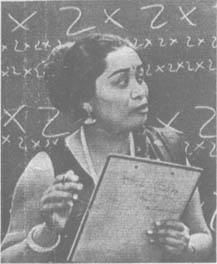‘Human Computer’ Shakuntala Devi Dies: How Did She Become a Mathematical Savant?

Shakuntala Devi, an Indian mathematical savant renowned worldwide as the "human computer," died on Sunday in Bangalore at the age of 83. Astounded researchers puzzled over the origins of her remarkable skill, but Devi herself maintained that anyone could become a math prodigy with the right motivation.
The cause of death was a combination of respiratory and cardiac problems, reported the New York Times. She is survived by a daughter and two grandchildren.
Born in 1929, Devi stunned family members in Bangalore with her prodigious ability to memorize and mentally manipulate large numbers at an early age. Her mathematical skills were even more remarkable because she had no formal schooling.
With the encouragement of her father, a circus performer, Devi publicly demonstrated her computational powers on road shows throughout India, eventually supporting herself and her family and gaining enough renown to tour Europe in 1950.
By the 1970s, she had become a household name in India for the astounding mathematical feats she performed around the world. In 1977, she calculated the 23rd root of a 201-digit number in 50 seconds— 12 seconds faster than a UNIVAC computer, one of the fastest machines of its day.
At the Imperial College in London in 1980, she earned a spot in the Guinness Book of Records for taking a mere 28 seconds to correctly multiply two randomly selected 13-digit numbers— 7,686,369,774,870 and 2,465,099,745,779— and recite the product, 18,947,668,177,995,426,462,773,730.
Later in life, Devi expanded into other realms of achievement, offering popular Hindu astrology advice, writing puzzle books like "Puzzles to Puzzle You," promoting liberal views on homosexuality, and establishing the Shakuntala Devi Educational Foundation Public Trust to encourage math learning among children.
What Made Shakuntala Devi a Mathematical Prodigy?
Devi's astounding computational talents fascinated psychology researchers, who struggled to explain her abilities.
She shot down speculation that mathematical skills ran in her family, maintaining that none of her relatives had remarkable talent in arithmetic. Devi joked that her daughter fell far short of her abilities, relying on a calculator as a university student.
She also broke stereotypes of mathematical savants, who were generally thought to have withdrawn, autistic personalities like Kim Peek, whose extraordinary abilities inspired the fictional 1998 film Rain Man.
In a high-profile study published in the journal Intelligence in 1990, educational psychologist Arthur Jensen described Devi as a natural extrovert, fluent in several languages aside from English and with the "stage presence of a seasoned performer."
While observing her at a reception following a 1988 performance at Stanford University, Jensen marveled that "among strangers she was entirely at ease, outgoing, socially adept, self-assured, and an engaging conversationalist. To all appearances, the prodigious numerical talent resides in a perfectly normal and charming lady."
Jensen investigated Devi's phenomenal intellect with a series of computational and cognitive challenges, which revealed that Devi's performance on basic cognitive tasks was unexceptional, contrasting sharply with the incredible speed of her complex arithmetic calculations.
He suggested that Devi overcame the normal limits of working memory, which processes new information about tasks at hand, with highly organized and efficient long-term memory strategies that she had developed with a lifetime of practice.
"Some kind of motivational factor that sustains enormous and prolonged interest and practice in a particular skill probably plays a larger part in extremely exceptional performance" than any kind of innate processing speed advantage, concluded Jensen.
Devi herself said that she thought "anyone could do it if they loved numbers the way I do," or "if they had played with numbers for hours every day since early childhood."
As uplifting as that might be to aspiring mentalists, Jensen suggested that Devi's prodigious skills were "like a native language, whereas for most of us arithmetic calculation is at best like the foreign language we learned in school."
Can You Become A Mathematical Savant?
The basic mathematical operations she so easily demonstrated probably become automatic during the critical learning period of childhood, when the developing brain is most receptive to mastering complex skills.
Devi's facility with numbers came to feel so natural that she was unable to explain any specific strategies as an adult- much like a native English speaker would have trouble explaining the grammatical rules of the language without formal education.
Daniel Tammett, another well-known mathematical savant, is another example of the mysterious mental processes that promote incredible arithmetic skill. Tammett has high-functioning autism and synesthesia, which lets him see numbers and letters in his mind as having characteristics like shapes, colors, and personalities. Among other feats, this type of thinking allowed him to become conversational in Icelandic in only a week and set a world record for reciting the number Pi to 22,514 digits.
It's unlikely that an average child could develop mathematical skills as prodigious as Devi's or Tammett's just by practicing, but human memory is remarkably flexible.
Writer Joshua Foer popularized the art of memory training in his recent high-profile book Moonwalking with Einstein, which recounts how he spent one year developing mnemonic memory strategies that allowed him to win the United States Memory Championship. Despite lacking any extraordinary gift for memory, Foer used techniques that capitalized on the average brain's existing memory capacity.
One can train to develop superb memorization skills like Foer did, but healthy adults shouldn't expect to develop fantastic arithmetic abilities on par with Devi's.
Repetitive brain training games that claim to expand working memory are increasingly common, but research suggests their benefits for average adults are minimal.
The best one can hope for in promoting cognitive function is staying fit and mentally active, and perhaps encouraging a love of math in the next generation of potential Shakuntala Devis.



























